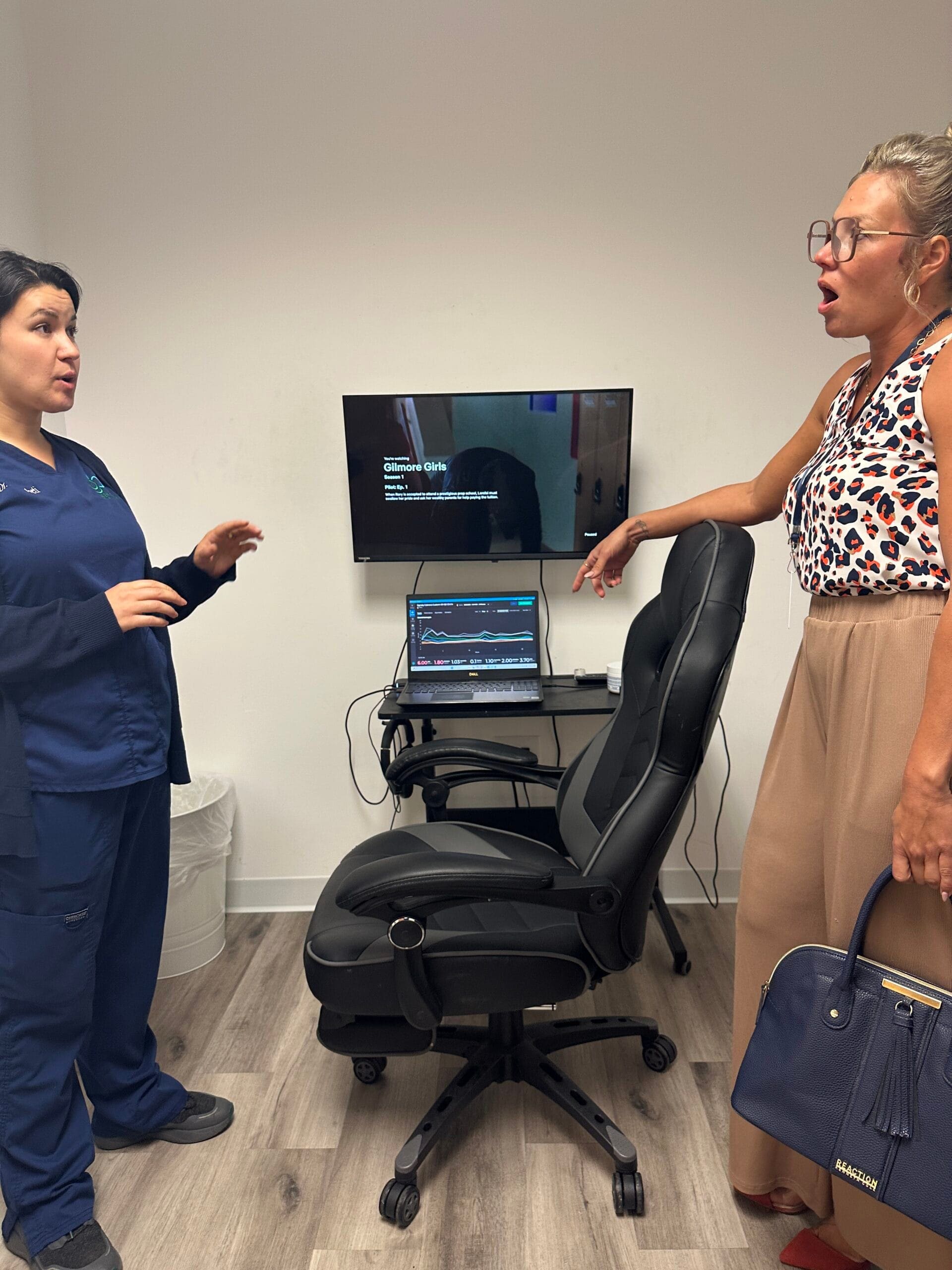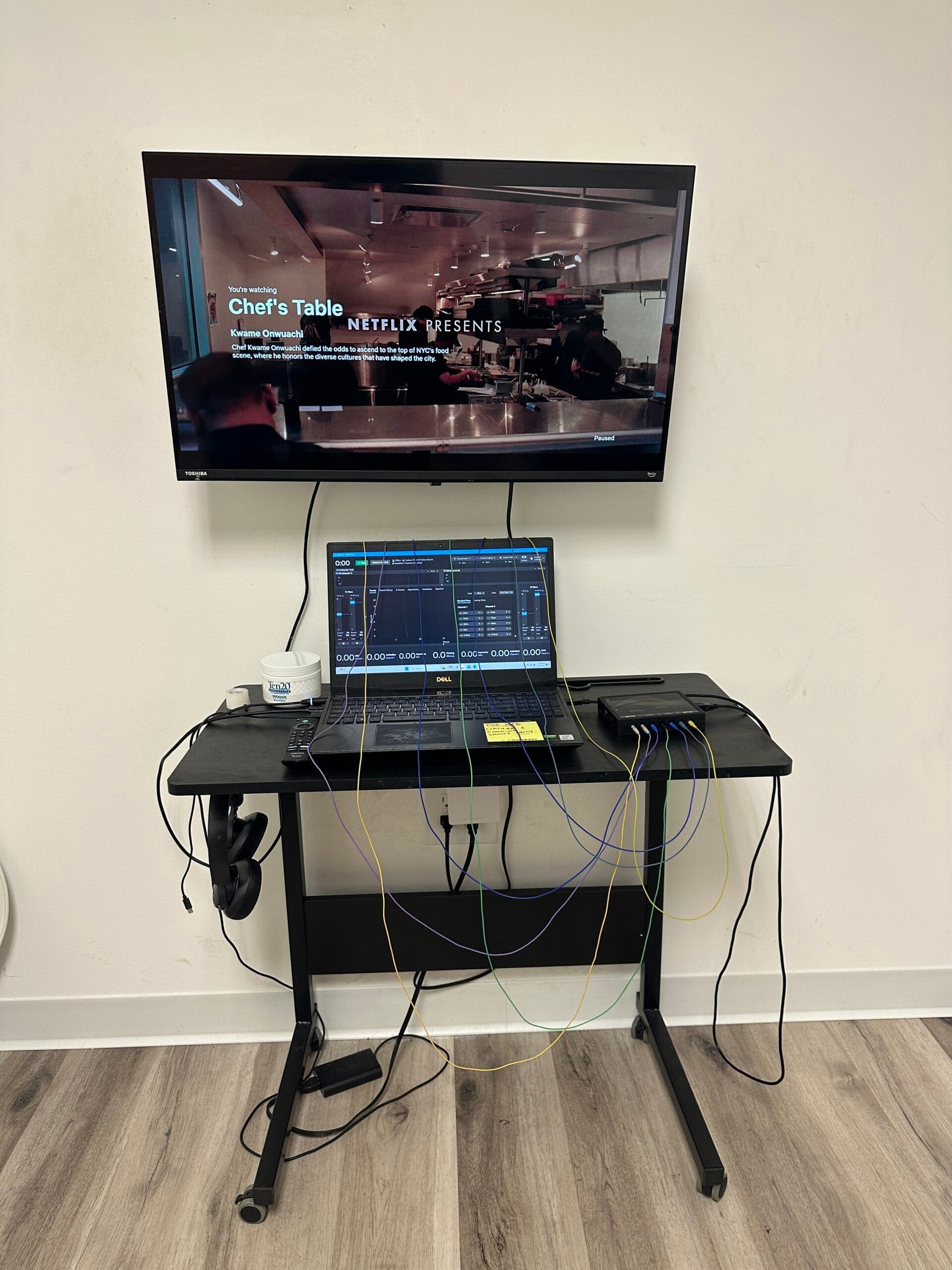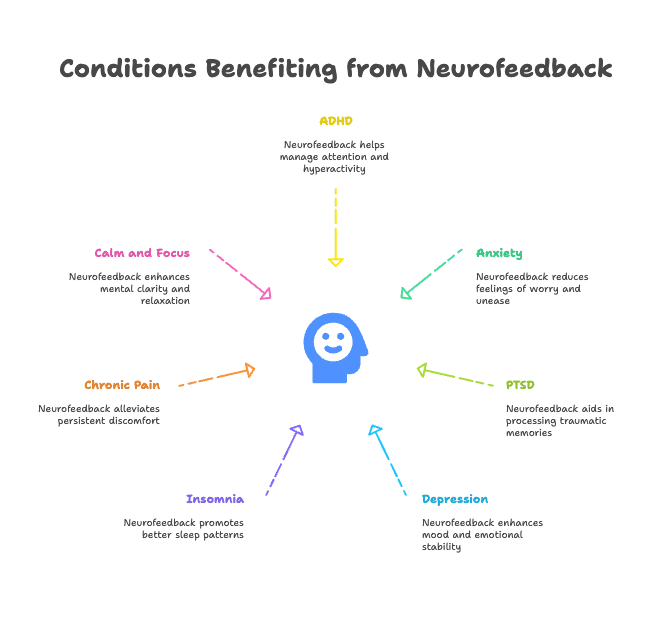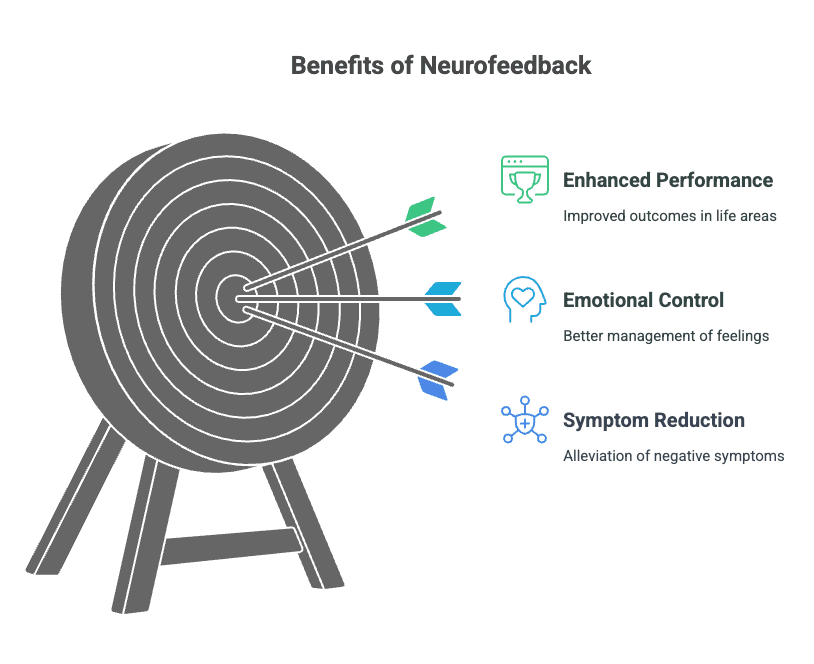Neurofeedback Therapy Tampa FL: Brain Training That Gets Real Results
What if your brain isn’t broken—just out of tune?
Maybe you’re a parent who’s tried everything for your child’s ADHD and is still searching for answers.
Maybe you’re the high-achiever who looks successful on the outside but is constantly anxious, foggy, or exhausted on the inside.
Maybe you’ve seen specialist after specialist, tried the medications, and gone through therapy—but deep down, you still don’t feel right. You feel off. Like your brain isn’t firing the way it used to.
You are not alone. And more importantly—you’re not out of options.
At Genesis Brain Institute in Tampa, Florida, we believe your brain has the power to change.
Neurofeedback Therapy is a powerful, science-backed way to help it do just that.
This isn’t guesswork. This isn’t another prescription. This is real brain training—guided by data, backed by neuroscience, and customized to how your brain works.
- Neurofeedback Therapy Tampa FL
- Neurofeedback Therapy Tampa Florida
- Neurofeedback Treatment in Tampa FL
- EEG Biofeedback Tampa
- Brain Training for Focus Tampa
- Drug-Free ADHD Treatment Tampa

You’re in the right place.
Let’s break down everything you need to know—so you can stop spinning your wheels and start seeing results.
What Is Neurofeedback Therapy and How Does It Actually Work?
Neurofeedback is like giving your brain a mirror.
Every day, your brain generates patterns of electrical activity. Some of those patterns help you stay focused, calm, and emotionally regulated. Others lead to distraction, anxiety, insomnia, or shutdown.
With Neurofeedback Therapy, we measure those brainwaves in real time using sensors placed on your scalp (nothing goes into the brain). You then watch a movie or show. When your brain hits ideal frequencies, the screen plays bright and clear. When your brain drifts into dysregulation, the screen dims.
Your brain doesn’t like the dim screen. So, without conscious effort, it adjusts. Trains. Learns.
That’s neuroplasticity in action. And over time, your brain rewires itself for better performance—without needing to try harder.


Who Is Neurofeedback Therapy Best For?
Neurofeedback is ideal for:
- Children struggling in school or social environments
- Teens with anxiety, sleep issues, or ADHD
- Adults dealing with burnout, depression, or trauma
- Athletes and executives seeking peak performance
- Seniors noticing memory loss or mental fog
Whether you’re looking for help with a diagnosis—or just want to function at your best—this therapy is for you.
One mom described it as:
“The first time in years I saw my son smile without anxiety behind his eyes.”
A CEO told us:
“It’s like someone took a flashlight and finally showed me the way through the fog.”
Is Neurofeedback Therapy Safe and Backed by Real Science?
Yes—and the research is extensive.
Thousands of studies over the last 40 years confirm neurofeedback’s safety and effectiveness for conditions like:
- ADHD
- Anxiety
- PTSD
- Depression
- Insomnia
- Chronic pain
In fact, the American Academy of Pediatrics rates it as a “Level 1” or best-supported treatment for ADHD.
There are virtually no side effects when used under expert care. The most common response? A deep sense of calm and focus.
The danger comes when people try DIY devices or providers skip proper diagnostics. At Genesis, every program is built from a full neurological evaluation and run by brain health professionals—not machines or software alone.

What’s a qEEG Brain Map — and Do I Really Need One for Neurofeedback Treatment?
Imagine trying to fix your car engine without ever lifting the hood. That’s what it’s like doing neurofeedback without a brain map.
A qEEG (quantitative electroencephalogram) lets us:
- See which brain areas are overactive, underactive, or out of sync
- Understand the root of your symptoms—not just guess
- Create a completely customized treatment plan
Why Guessing Won’t Work—But Mapping Will:
What Does a Neurofeedback Therapy Session Actually Feel Like?
It’s incredibly relaxing. You’ll sit in a comfortable chair, watch a show of your choice (kids often choose cartoons, adults watch Netflix), and let your brain do the work.
Most clients report feeling:
- Clearer
- Calmer
- Sleepier afterward
You don’t “try” to make the screen work better—your brain figures it out naturally, just like learning to ride a bike or drive a car. It’s learning through feedback—not force.
Over time, these sessions create a new default for your brain: one that feels less stressed, more focused, and more like “you.”
Can Neurofeedback Make You Smarter?
Here’s the honest answer: neurofeedback therapy won’t turn you into a genius overnight—but it absolutely can help your brain work smarter.
When your brain is functioning more efficiently:
- Focus improves
- Processing speed increases
- Mental clarity sharpens
- Cognitive endurance lasts longer
Think of it like tuning a high-performance engine. The car is the same—but when it’s optimized, it drives faster, smoother, and more reliably.
Neurofeedback helps remove “mental noise” and redirect energy from survival-based stress patterns to higher-order thinking—giving your brain the freedom to operate at its full potential.
That’s why athletes, CEOs, students, and creatives are turning to this therapy—not because something is broken, but because they know there’s more inside them waiting to be unlocked.
In short? It won’t add IQ points, but it can absolutely enhance your ability to use what you already have.
What Is the Goal of Neurofeedback?
Neurofeedback therapy helps your brain regulate itself more effectively. That means:
- Reduced symptoms like anxiety, impulsivity, or brain fog
- Improved emotional control and resilience
- Enhanced performance in academics, work, and relationships
At its core, neurofeedback helps your brain shift from survival mode to thrive mode. It retrains your central nervous system to respond with clarity, calm, and confidence—no matter what life throws your way.
It’s not about becoming someone else. It’s about helping your brain operate at its personal best, naturally and consistently.
Whether you’re overcoming trauma or chasing greatness, that’s the real goal: helping your brain become the strongest, clearest version of you.

Neurofeedback helps remove “mental noise” and redirect energy from survival-based stress patterns to higher-order thinking—giving your brain the freedom to operate at its full potential.
That’s why athletes, CEOs, students, and creatives are turning to this therapy—not because something is broken, but because they know there’s more inside them waiting to be unlocked.
In short? It won’t add IQ points, but it can absolutely enhance your ability to use what you already have.
Is Neurofeedback the Same as Biofeedback?
They’re related—but not the same. And together, they’re even more powerful.
Neurofeedback therapy focuses on the electrical patterns of your brain. Biofeedback therapy focuses on your body’s physiological functions—like heart rate, muscle tension, breathing, and skin temperature.
At Genesis Brain Institute, we often combine both. Why?
Because your brain and body talk to each other constantly. When your nervous system is dysregulated—due to trauma, stress, or imbalance—your heart rate variability, breathing patterns, and muscle tone all change. That creates a feedback loop that reinforces stress.
By using neurofeedback to train the brain and biofeedback to regulate the body, we create a full-loop system that restores internal balance. The result? Faster healing, deeper calm, better focus, and long-term resilience.
As Cameron Allen explains:
“Biofeedback helps calm the peripheral system. Neurofeedback helps rewire the central nervous system. Together, they synchronize the whole person—body, brain, and behavior.”
This integration is part of why Genesis programs get results when others don’t. We don’t just treat the symptom—we restore the whole system.
Does Neurofeedback Therapy Really Work?
The honest answer? Yes—especially when done with precision and purpose.
Neurofeedback isn’t hype. It’s grounded in decades of neuroscience research and clinical application. Thousands of peer-reviewed studies confirm what our patients already know: a well-functioning brain can transform how you think, feel, and perform.
But here’s the catch—not all neurofeedback is created equal.
At Genesis Brain Institute in Tampa, we don’t guess. We map your brain, assess every layer of your nervous system, and create a tailored treatment protocol that zeroes in on what’s really going on.
We’ve seen:
This therapy works because it teaches your brain to regulate itself. It’s not about forcing change. It’s about showing your brain what “calm,” “focused,” and “balanced” actually feel like—and letting it return to that state more often, more easily, and eventually on its own.
“When the brain learns the right rhythm, everything gets easier—thinking, sleeping, connecting, thriving.” — Cameron Allen, Neurotechnologist & CEO, Genesis Brain Institute
Whether you’re battling brain fog, emotional reactivity, poor sleep, or constant anxiety—neurofeedback may be the breakthrough you’ve been hoping for
Additional FAQ: Neurofeedback Therapy in Tampa
Is Neurofeedback Therapy FDA-approved?
Yes. When performed with FDA-approved equipment and under professional supervision (like at Genesis Brain Institute), it meets FDA safety standards.
Does Neurofeedback Work for Kids With ADHD or Autism?
Absolutely. It’s one of the most effective drug-free interventions for both ADHD and Autism Spectrum challenges, especially when paired with diagnostic precision.
Can Neurofeedback Make Symptoms Worse Before They Get Better?
Rarely, but it can feel different at first. As your brain learns new patterns, it may need time to adjust.
How Is Neurofeedback Different from Meditation or Mindfulness?
Mindfulness requires conscious effort. Neurofeedback trains the brain at a subconscious level—passively and precisely.
Can I Do Neurofeedback Therapy While Taking Medication?
Yes. Many clients gradually reduce or eliminate medications over time, but this should always be guided by your physician.
What Happens If I Miss a Session or Can’t Come Every Week?
Consistency matters—but missing a session occasionally won’t derail your progress. We’ll adjust your protocol accordingly
Is There Anyone Who Shouldn’t Do Neurofeedback?
It’s not recommended for individuals in active psychosis or substance use during sessions. Otherwise, it’s safe for nearly everyone.
Will I Feel Anything During the Session?
Most clients feel deeply relaxed and alert. It’s comfortable and pain-free.
Is Neurofeedback Covered by Insurance?
Generally no, but some clients use FSA/HSA funds or receive partial reimbursement when sessions are coordinated through licensed mental health counselors.
What If I’ve Tried Everything—Will Neurofeedback Still Work?
Many of our clients say that Neurofeedback was the breakthrough they were praying for—especially after trying therapy, medication, or other treatments without lasting results.
How Many Sessions Does It Take to See Results?
Some feel a shift after 3–5 sessions. For lasting change, most complete 30–40 sessions, spaced weekly. Our qEEG maps track progress every step of the way.
How Do I Get Started With Neurofeedback Therapy in Tampa?
Call Genesis Brain Institute today. We’ll start with a 30-minute consultation, then run your brain map. From there, we’ll create a custom plan based on what your brain actually needs—not guesswork.

The Next Step Is Simple
If you’re in Tampa and looking for a science-backed way to finally:
- Sleep better
- Focus more clearly
- Break free from anxiety
- Or give your child the chance they deserve
Then Neurofeedback Therapy at Genesis Brain Institute may be the answer.
Hope is real. And it starts with a brain map.
Because your brain—and your future—deserve clarity.
